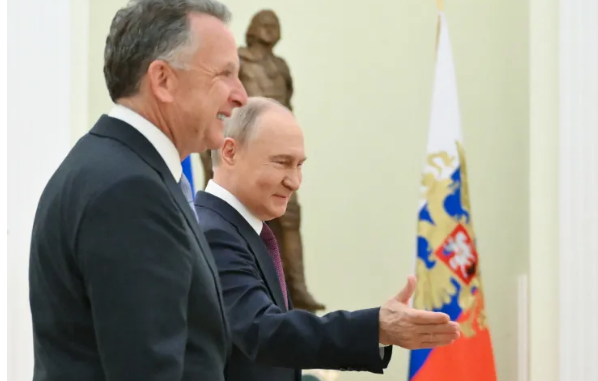
Russian President Vladimir Putin shows the way to US President Donald Trump’s envoy Steve Witkoff during a meeting in Moscow, Russia, on April 25, 2025 [Sputnik/Kristina Kormilitsyna/Pool via Reuters]
| Published May 8, 2025
The situation surrounding the Russia-Ukraine peace talks, particularly with the involvement of Putin and Trump, presents several potential pros and cons:
Pros:
-
Potential for a Ceasefire:
-
The ceasefire proposal, even if short-term, offers a temporary reduction in violence, which could save lives and allow for humanitarian aid to reach areas in need.
-
-
End of Conflict:
-
Trump’s interest in quickly ending the war aligns with broader global desires to see the conflict resolved and to avoid further escalation. A resolution could ease international tensions.
-
-
Diplomatic Engagement:
-
Engaging with Putin on peace talks, even if controversial, could open up opportunities for dialogue and future negotiations. A peace plan could lead to a breakthrough that brings all parties to the table.
-
-
Global Stabilization:
-
A negotiated settlement between Russia, Ukraine, and the U.S. could help stabilize Eastern Europe and reduce the likelihood of broader conflict, particularly with NATO.
-
Cons:
-
Putin’s Manipulation:
-
There are concerns that Putin may be using the ceasefire and peace talks as a way to manipulate Trump, gaining time to solidify his position while avoiding meaningful concessions to Ukraine or the West.
-
-
Compromising Ukraine’s Sovereignty:
-
Trump’s peace plan, which might include recognizing Crimea as part of Russia and blocking Ukraine’s NATO membership, risks undermining Ukraine’s sovereignty and territorial integrity, potentially rewarding Russia’s aggressive actions.
-
-
Lack of Concrete Security Guarantees for Ukraine:
-
Without clear security guarantees for Ukraine, a peace deal could leave the country vulnerable to future Russian aggression or other international pressures, leading to instability in the region.
-
-
International Criticism:
-
Both Trump and Putin face criticism for their approaches. Trump may alienate both Ukrainian allies and his own domestic supporters, while Putin’s actions could further isolate Russia from the international community, particularly if his tactics are perceived as manipulative.
-
Conclusion
The unfolding situation involving Putin’s ceasefire proposal and Trump’s peace plan presents both opportunities and significant risks. While there is potential for reducing violence and seeking a resolution to the conflict, the manipulation of negotiations and potential compromises on Ukraine’s sovereignty raise serious concerns. The lack of concrete security guarantees for Ukraine and the possibility of rewarding Russia’s territorial gains could undermine the long-term stability of the region. Thus, while a peace deal might provide short-term relief, the broader implications of such an agreement require careful consideration to ensure it doesn’t pave the way for further instability or Russian aggression.





Be the first to comment